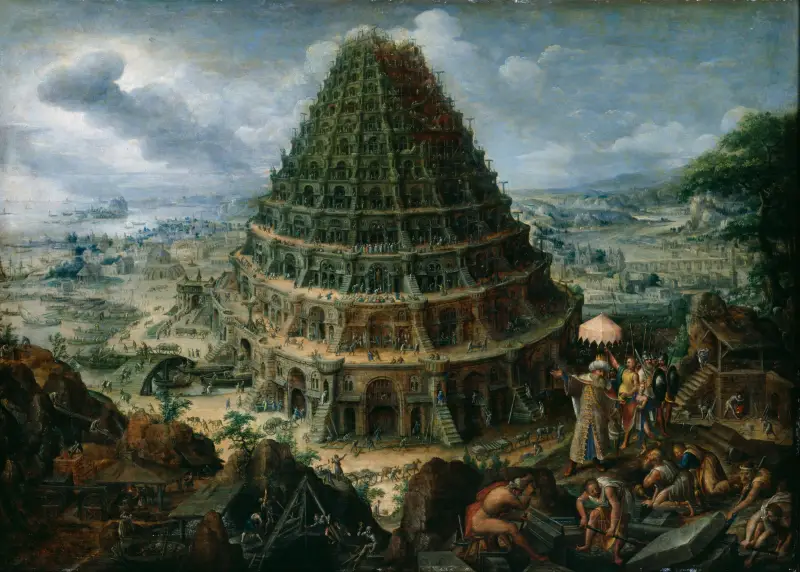Amos Yong at the Missio Alliance talked today about “the phenemonology of interruption” in Pentecost. Interruption is how God expresses His sovereignty. Humanity muddles along in our reality that we can’t imagine being any other way, and events happen that do not fit “the way things are.” Our paradigms are shattered, and we are forced to grapple with the terror that Somebody greater than the projected Geist of our civilization has tinkered with us. Pentecost is the eternal event of the Spirit’s interruption. The opposite of Pentecost is ideology, the stasis of homogenized idolatrous “truth” that tries to substitute itself for God, what Slavoj Zizek calls “the big Other” and what Christians with a perspicuous (idolatrous) account of Biblical truth would call the “owner’s manual.”
Zizek has a concept (probably not original to him) that every truth is definitively a fiction. I’m sure it sounds like an obnoxious “relativist” thing to say, but stay with me. What it means is that any sentence we write to explain reality (a “truth”) is always only an approximation of what we’re talking about (a “fiction”). This is because reality is not finite, since our infinite Creator has flooded every object in His creation with infinite sacramental depth that proclaims His glory. So no sentence or even book however long can ever do justice to the truth of creation (if it really is the perpetual, dynamic artwork of an infinitely transcendent Creator).
Twenty years ago as a high school kid doing parachurch Bible study, I had drilled into me the notion that there are two sides when it comes to truth: team absolute truth and team relativism. “Relativism” heaped together hedonists with no ethical standards, people who think that believers of other religions aren’t necessarily going to hell, and people who think that it’s okay to negotiate with Democrats. “Absolute truth” means that because there’s one God, there’s one truth that we can find in the Bible, and the world around us is really real and not just a product of our imagination that everybody gets to have a different set of facts about.
There is a mischievous, cynical relativism in which people whose law is their belly, to use a Pauline expression, argue against any sense of authority or discipline for narcissistic, self-indulgent reasons. Sometimes this is called being a hippie, though it’s possible to be a hippie with principles. At the same time, “absolute truth” can easily become a commitment to the infallibility of my ability to appropriate truth, which is actually a claim that truth can’t be truth if it transcends my comprehension, thus making me or whichever authoritative interpreter I submit to absolutely my idol.
The question is whether it’s okay with me for truth that I cannot ever understand completely to exist. I may have a medium for accessing it like the testimony passed down from the people who knew the divine man who was Truth, but if He is who He says He is, then we can never explain everything about Him exhaustively. For the Bible to serve its proper function, we must see its testimony as an icon that points to truth rather than a finite set of content that we can seize, own completely, and control, which is the definition of idol. The medium is finite; the Truth to whom
it points is not. Jesus didn’t say the Bible is the way, the truth, and the life; He is. Paul said that Jesus breathes through the Bible; He breathes through other things too and we’re better able to decipher what He’s saying in other contexts if we’re thinking in the poetry God gives us through scripture.
This is different than the idolatrous view of the Bible as an “owner’s manual.” Owner’s manuals are supposed to be a finite, exhaustive set of self-evident content; they exist to preclude the need for calling a live “tech support” person and asking for guidance. Owner’s manuals are intended to replace relationships. A collection of words by itself is a finite medium for learning something that you move beyond; a relationship is an infinite medium for perpetual learning; it is only the relationship with the author or interpreting community that gives any book infinite meaning by offering an infinite depth of interpretive possibility.
When a community is operating under an idolatrous notion of truth as “owner’s manual,” its belief system becomes ideological and reductionist, its teaching is no longer about discovering new depths but about policing conformity. Those who do the policing are the true sovereigns in this ideological community, not the God they supposedly worship. The living water of infinite truth is boiled down until only sand remains.
How does God regain His sovereignty in such a community? By interrupting it through the Pentecostal outpouring of the Holy Spirit on “sons and daughters who testify” (Joel 2:28). God interrupts us through the prophecy of people whose testimony has no merit according to our existing conventions. A question I put out on twitter as Yong was talking is whether others think that today’s Pentecostal interruption has a queer feel to it (as opposed to the “masculine feel” John Piper gave Christianity). Unsurprisingly no one responded.
I do wonder though if God’s purpose for the homosexuality debate in our culture is to rescue Christians from the idolatrous, perspicuous approach to the Bible driven by the sovereignty needs of conformity police whose faces light up Jumbotrons in satellite campuses idolatrously where people watch with whom they will never have relationships. Tim Keller said that exploring a way for queer Christians to live chaste and holy but not necessarily celibate, disembodied lives would require throwing out everything about the way he reads the Bible. Sounds like a Pentecostal interruption to me.











